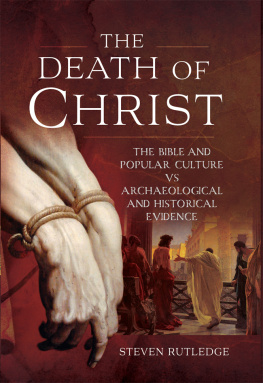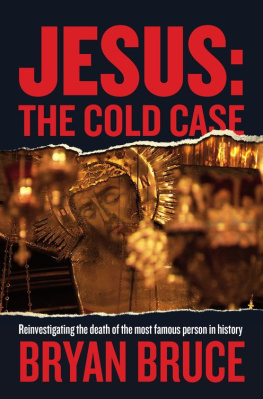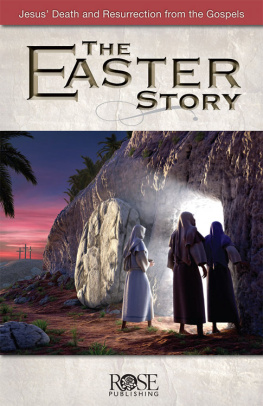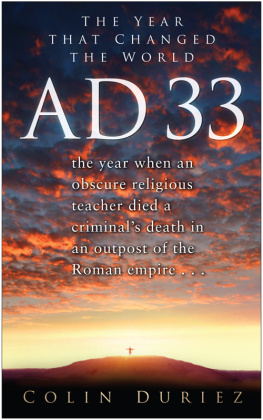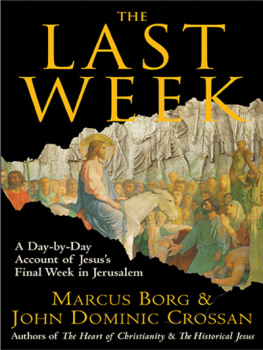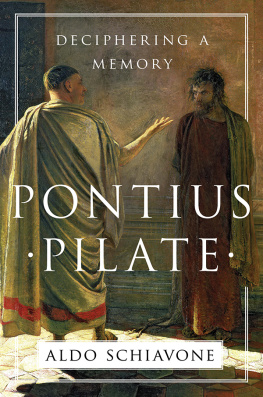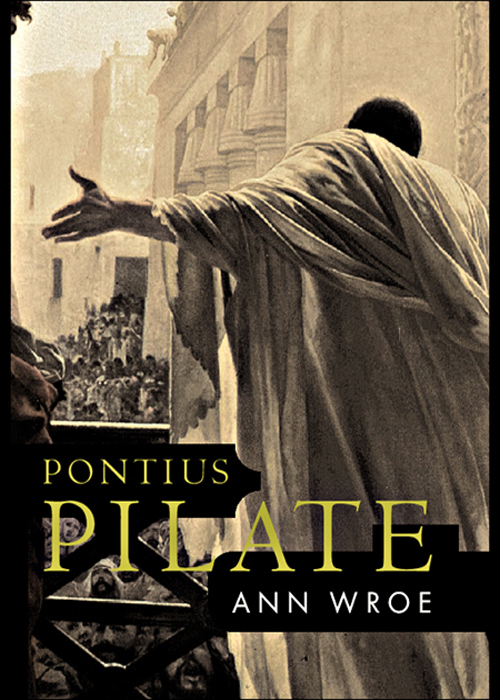
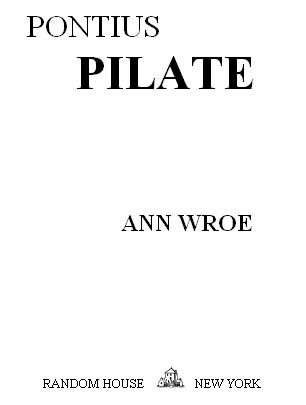
Contents
For my husband
Introduction
W HY PONTIUS PILATE? Couldnt you choose a different subject? cries the demon Woland to the Master in Bulgakovs The Master and Margarita. And well may the Master wish he had chosen something else. His novel about the fifth governor of Judaea, the man who crucified Christ, has been rejected by his editor and savaged by the editorial board. So he has burned it in the stove, and now finds himself in Dr. Stravinskys hospital for the insane.
The Master tells his story to Ivan Nikolayich Poniryov, also in the asylum for Pilate-related reasons. The demon has sown thoughts of Pilate in Ivans head. Because he cannot stop talking about him, he is regularly injected with ether and subjected to reflex therapy with hammers. He is told that it is hazardous to his health to think about Pilate at all. Of course, he is not put off. He wants to struggle free and report everything to the police. The head of the asylum tells him, kindly, that if he were to turn up at the police station dressed as he is, in his underpants, saying he has met a man who has met Pontius Pilate, he would rapidly be recommitted.
Because of my underpants? Ivan asks.
Chiefly because of Pontius Pilate.
When I first read Bulgakov, I laughed at this exchange. Once Pilate was under my skin, I began to worry. How had he arrived there? Could he be made to go away? Did I really want to pursue this and, if I did, how much charred ash would my manuscript produce?
There were other difficulties, beyond failure and scorn and madness. Pilate would bring me up against two redoubtable tribes, biblical scholars and classical experts. I would be plunged into the dark waters of anti-Semitismfor Pilates reputation has often, though not always, risen and fallen with attitudes toward the Jewsand drawn into impossible controversies about the Resurrection. I would find myself arguing over obscure dates and personalities, while Pilatethat strange amalgam of human struggling and human failingwould slip away from me.
Friends were no help. Pilate? But surely we know nothing about him! theyd say. Their next question, invariably, was So, was he a goodie or a baddie, then? When I mumbled some response (I still do; how many flaws and failings, how often repeated, make up a bad man?) they would leap in with details they felt sure I would appreciate. One friend told me she had heard that Pilate was Hungarian (Hungarians, Im sure, think he was Romanian). Another exclaimed: Ah! Fortingall! His story was that Pilate was born in this village, seven miles west of Aberfeldy on Tayside, the son of a Roman ambassador and a daughter of the clan MacClaren. On the site of the earthworks there, known locally as the Praetorium, the Roman dignitary and his Scottish lass had somehow come together under the northern rain to produce the dour interrogator of Christ.
For three years or so I did research on Pilate. There was almost nothing to go on. We do not even know his praenomen, the name his mother and wife and friends called him by. The only physical evidence we have of this man is one inscribed stone and a few small coins. All the records he kept, as he was bound to keep them, have disappeared, and so have two chapters of Tacitus, covering A.D. 30 and 31, that might have mentioned him. The only documentary sources for Pilate are a few paragraphs in the writings of Josephus, a Romanized Jew who wrote forty years after the governor was recalled from Judaea; two or three pages from Philo of Alexandria, a defiantly non-Romanized Jew and one of Pilates contemporaries; one sentence in Tacitus, looking back from the time of Hadrian; and those almost too-familiar scenes from the New Testament. All these have their biases. Each offers a version of Pilates character, but so wrapped in propaganda or agendas that it is difficult to detect what, if anything, may be true in them.
Plenty of people have tried to fill in the gaps, though. They have fallen over themselves to make Pilate up, because he stands at the center of the Christian story and Gods plan of redemption. Without his climactic judgment of Jesus, the world would not have been saved. Without Christs deathpronounced by Pilatethere would have been no Resurrection, no founding Christian miracle. To have a faceless bureaucrat at the heart of this drama was unacceptable: something had to be made of this man.
Early Christian apocryphal writers scrambled to embroider Pilates conduct before, during and after the trial of Jesusespecially after, when they imagined he began to feel Christian sympathies. Medieval writers invented his origins, which they took to be German, and built up his disreputable childhood and youth. Tremendous myths were created to account for the lost last years of Pilates life. As a result, although the real Pilate is frustratingly hard to uncover, the mythological Pilate emerges ten feet tall.
This was the next stage of my research. I ransacked the London Library for the apocrypha and hagiographies of Pilate, written by obscure clerics centuries ago and translated with nineteenth-century enthusiasm into huge quarto volumes. I read fairy tales, legends, travelogues, guidebooks, to follow where his ghost had walked around Europe. With (almost) unflagging ardor, and usually in dusty solitude, I checked every life of Christ on the fifth-floor Theology shelves to track how Pilate had been seen by commentators in Europe and America for the past two centuries. Then, as an antidote, and to try to get close to some shadow of the Roman Pilate, I read whatever literature I could find from his lifetime or from shortly before or after. I did this not just to find out the duties of governors or the monstrosities of emperors, but to try to ascertain the view of the world someone in his position might have had. This would always have to be an approximation; however vivid, this Pilate-shadow would never be the real one. But it was better than nothing.
At the end of three years, I emerged with two things: the shadow, and the myths. It did not seem like the stuff of biography. But biography is often more speculative, more selectiveeven more fictionalthan writers admit or readers suppose. Much of it begins as a mass of reported or unsubstantiated stories, reflections, impressions, legends, which must then be filtered through the views and attitudes both of the biographer and of the age. Aspects of a life belittled in one biography are central to the next. Characters themselves ebb, flow and go on growing after death. Even the sternest of biographers let their imaginations play with their subjects. They speculate on their motives, pass judgment on their actions, fill in the gaps. Their own sense of a mans importancetheir own mythology of himflavors every sentence. And through it all the real man slips, eluding capture.
Pilate is an extreme case: successive writers, intoxicated by what he represented and unhindered by knowing much about him, invented him almost from scratch. All these Pilates contribute, in greater or smaller degree, to the Pilate we suppose we know; they are fragments of his life. This book reflects that. It proceeds as a collage of biographical scenes moving sequentially through the life of Pilate. Some are Roman, some Victorian, some medieval, some early Christian, some even modern. Centuries may shift at the turn of a page. But the constant thread, which readers should hold on to, is the life and character of Pontius Pilate from his birth to his death, and then some.
Next page


